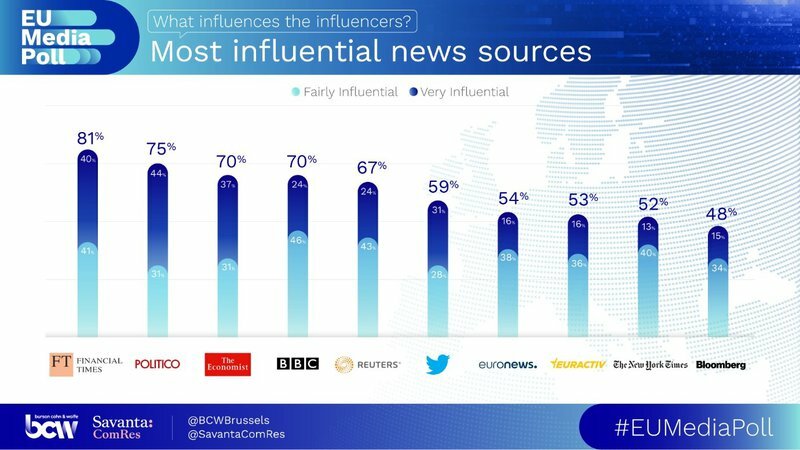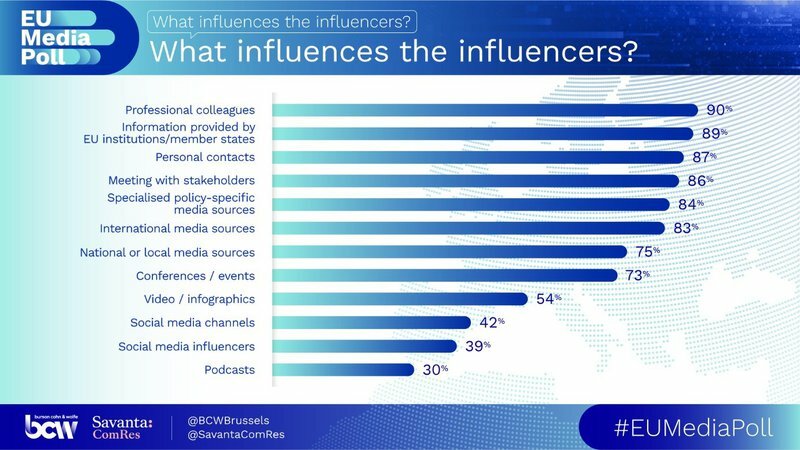Key Insights
- The Financial Times is the media most often considered influential by EU decision-makers
- Politico is most often considered ‘very influential’
- WhatsApp has overtaken Twitter as the social media influencers turn to most
- Professional relationships remain most influential in shaping decisions
The Financial Times (FT) is most often cited as influential in terms of providing the news and information EU influencers need to make informed decisions, according to a new survey by BCW Brussels and Savanta ComRes. Four in five (81%) EU influencers consider the FT to be ‘very’ or ‘fairly’ influential, 19 percentage points more than in 2018. Politico Europe remains the media source most likely to be considered ‘very influential’, whilst the Economist, BBC and Reuters also make it to the top five.
Since 2016, the EU Media Poll has surveyed EU decision-makers – Members of the European Parliament (MEPs), EU officials and NGOs – on the sources of news and information they rely on to make informed decisions. The survey also explores how media and social media platforms compare with other sources of influence, including professional colleagues, personal contacts and events, and is now a go-to reference for EU communications professionals looking to deliver impactful integrated communications.
“While disintermediation and disinformation shape today’s global debate, it’s reassuring that EU decision-makers are still relying on quality journalism to inform their decisions,” said Andrew Cecil, CEO of BCW Brussels. “The EU Media Poll shows that despite these shifts in the media landscape, quality news and information still rises to the top and remains critical to moving people and reaching influencers as part of an integrated communications strategy”.
“What we’ve seen in the past two years is an increase in influence of all media outlets – no doubt fuelled by Covid-19, Brexit and recent US election coverage,” said Meghan Oliver, Director at Savanta ComRes. “Given that different outlets have different strengths – whether it’s the level of expertise offered by the Financial Times or the insider access of Politico – influencers likely use a multitude of outlets to meet their needs. Given the increasing pressure that journalism has faced – both cuts to newsrooms and attacks on the profession itself – it’s great to see the impact high quality journalism continues to have on key decision makers”.

Those considering the Financial Times and the Economist to be ‘very influential’ associated their influence with the level of expertise, quality of journalism and reputation, whilst Politico’s influence was attributed to its insider access, audience reach and timeliness.
WhatsApp has overtaken Twitter as the social media most used by EU influencers, with a 15 percentage points rise in influencers using WhatsApp at least once a week.
As in 2018, personal and professional relationships remain most influential, with 90% of respondents indicating they influence their decisions. Information provided by EU institutions and Member States (89%) and personal contacts (87%) are also considered highly influential.

The full results of the survey can be found on the BCW Brussels and Savanta ComRes websites. The findings will be analysed in a webinar on 25 November, featuring Sam Fleming, Brussels Bureau Chief of the Financial Times; Stephen Brown, Editor in Chief of Politico Europe; and Tiemo Wölken, Member of the European Parliament and Elena Calistru, Founder of Funky Citizens.
About the EU Media Poll
The EU Media Poll is the largest survey of media consumption among EU decision-makers and opinion leaders, conducted by BCW Brussels and Savanta ComRes since 2016.
you might also like
Explore allEurope
From Nudge to Move
Europe
BCW's 2018 Report on Artificial Intelligence
Europe
BCW Influence Index Ranks Parliamentary and Public Influence of European Policymakers
Europe
BCW Political Insight: The Endgame for Prime Minister Boris Johnson?